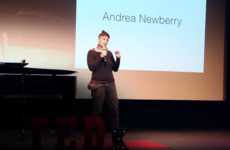
Need Inspiration?
Get inspired by 4,000+ keynote speaker videos & our founder, a top keynote speaker on innovation.
In Her Talk on Shame, Minh Dang Considers Human Trafficking
Riley von Niessen — May 9, 2017 — Keynote Trends
Minh Dang, an advocate on human trafficking, shares her own journey with her audience in her talk on shame.
After introducing herself, she invites her audience to close their eyes and to raise their hands to answer to a series of questions, which range from "raise your hand if you'd like to be called a prostitute," and "raise your hand if you've ever used the services of a prostitute." After taking the audience's response into account, she states that there's "no such thing as a prostitute," as this word simply paints an unfair picture of a person who's been made to hold the shame of others.
Dang continues her talk on shame by describing her pained childhood, when she was raped by her father and hated by her mother due to her twisted sense of jealously. Unhealthily, she began to internalized this hatred, and told herself that because she was fault, she was responsible for making it better. She goes onto explain sexual predation, which causes people to justify their violence for one another, and to pass on their shame to another person.
She continue to highlight the different ways that people pass on their shame, and the importance of understanding how and why they do this so that they can open their minds and accept those in need.
After introducing herself, she invites her audience to close their eyes and to raise their hands to answer to a series of questions, which range from "raise your hand if you'd like to be called a prostitute," and "raise your hand if you've ever used the services of a prostitute." After taking the audience's response into account, she states that there's "no such thing as a prostitute," as this word simply paints an unfair picture of a person who's been made to hold the shame of others.
Dang continues her talk on shame by describing her pained childhood, when she was raped by her father and hated by her mother due to her twisted sense of jealously. Unhealthily, she began to internalized this hatred, and told herself that because she was fault, she was responsible for making it better. She goes onto explain sexual predation, which causes people to justify their violence for one another, and to pass on their shame to another person.
She continue to highlight the different ways that people pass on their shame, and the importance of understanding how and why they do this so that they can open their minds and accept those in need.
4.5
Score
Popularity
Activity
Freshness

















